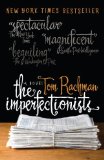
A Novel
by Tom RachmanRome. News. Two words which immediately reminded me of Joe Bradley, the fictional American journalist in William Wyler's Roman Holiday, a 1953 romance in which Bradley (Gregory Peck) encounters Princess Ann (Audrey Hepburn), a young woman who has escaped from her aides for a respite from making public appearances. He accompanies her on a tour of the city to write an exclusive story, though she remains unaware of his motive throughout much of the film. I started reading The Imperfectionists imagining that it might bear a similar banter and glamour. While it does contain cinematic moments, including occasions when a corrections editor cries out "Credibility!" during his rounds at the office - a hat-tip to a breezier, comedic style of dialog - as well as descriptions of the newspaper's formative years, which evoke a nostalgic version of Rome, Rachman's debut deepens the portrayal of opportunism that Roman Holiday introduces (and redeems in the final scenes, when Bradley decides not to publish his story). There are few such reversals in this book, which details a world where getting the "scoop" often triumphs over empathy for a subject's privacy, and where career ambitions determine the actions of many of the titular "imperfectionists" who struggle with pressures of work and home. Rare acts of forgiveness rub shoulders with stories of employees enacting revenge as their paper staggers under the strain of economic problems and inept leadership.
Two characters love partners who betray them. One woman maintains an arrangement with her older husband, who permits her to sleep with their neighbor because he understands that she is not "finished" with that part of her life; the editor-in-chief's husband cheats, just as the chief financial officer's ex-husband had done. Rachman's matter-of-fact approach turns these stories into meaningful character studies rather than voyeuristic glimpses. The affairs serve less to drive the plot than as a means for exploring how individuals respond to painful circumstances; in several cases, we meet them after their relationships have already begun to fray. There are no profound apologies for their lapses in judgment, either - an astute choice to prevent conclusions that could seem too epiphanic.
A welcome sign of goodness in the midst of unpleasant circumstances surfaces in the story of Arthur Gopal, an obituary writer whose daughter Pickle is a "wonderful nerd." In a field where appearances play a crucial role - from employees who feign ignorance or competence depending on which stance is most convenient, to public relations specialists who can frame any situation to benefit their clients - Pickle remains unaffected. She is a necessary, charming reminder of what life beyond the news world can offer, and a contrast to the less admirable characters.
Though it is tough to read about selfishness, this debut is noteworthy as a portrayal of everyday lives during decisive moments in a changing landscape. It successfully weaves between workplace drama and domestic tales to combine moments of free-spirited liveliness with a realistic sobriety about relationships that seldom survive the differences between those involved.
![]() This review was originally published in April 2010, and has been updated for the
January 2011 paperback release.
Click here to go to this issue.
This review was originally published in April 2010, and has been updated for the
January 2011 paperback release.
Click here to go to this issue.
Your guide toexceptional books
BookBrowse seeks out and recommends the best in contemporary fiction and nonfiction—books that not only engage and entertain but also deepen our understanding of ourselves and the world around us.